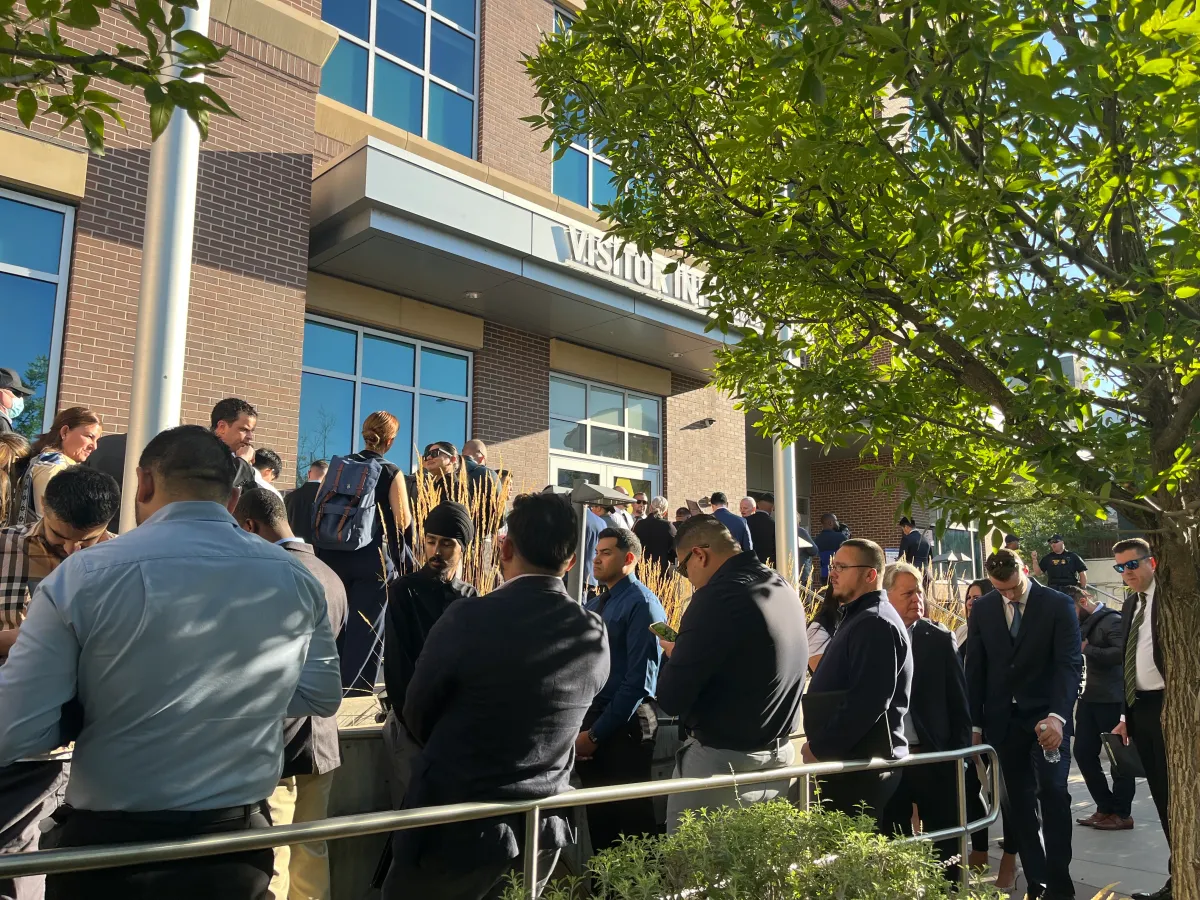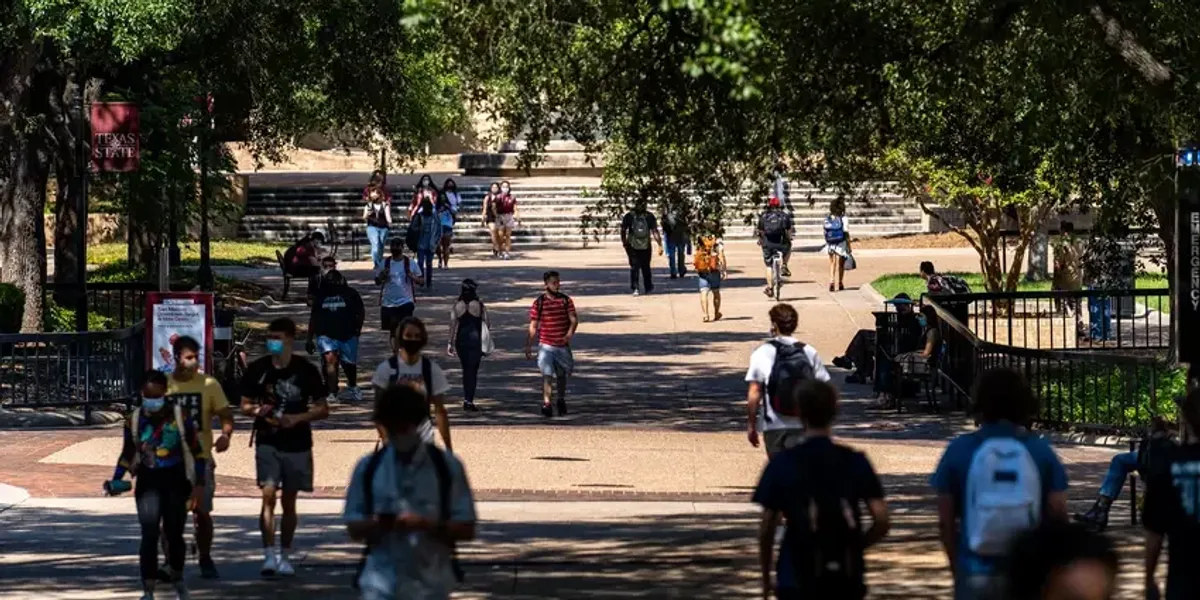
Tim is eyeing a career change. The 26-year-old has a full-time job with the Department of Veterans Affairs in Salt Lake City, but the pay isn’t enough. He recently spent a lot of money helping his husband, a Peruvian immigrant, settle in the U.S., so he’s looking for a higher salary.
“We worked hard to get him here. It was expensive to go through the process,” he told The Intercept. “I want to do something to educate and help the process go more smoothly for other people.”
That’s what brought him to the Department of Homeland Security’s Career Expo in Provo, Utah, five days after the shooting of conservative influencer Charlie Kirk, where the Trump administration was seeking new recruits for its anti-immigrant campaign.
Tim knows that federal agents are responsible for separating families under Donald Trump’s aggressive deportation push. But he thinks that’s a risk immigrants knowingly take living in the U.S. “You want to come here for a better life, but you gotta do it the hard way,” he said before submitting an application to join U.S. Customs and Border Protection.
At the Utah Valley Convention Center, hundreds of people like Tim stood in the sun, many in suits with briefcases and resumes at the ready. The biggest line was for the Immigration and Customs Enforcement booth; a smaller queue led to the CBP stall next door. Recruiters strolled by the applicants, asking if anyone was a lawyer or had tentative offers, and plucking them out of line. If your resume was selected, you might hear back within the hour for interviews, fingerprints, and a drug test.
With the Trump administration’s push to hire 10,000 new ICE officers by the start of 2026, attendees drove overnight or flew in with hopes to get a leg up on other applicants with some in-person time with DHS recruiters last week. They heard about it from friends or family, from social media posts, or from the 1811 forum on Reddit — a hub for “active and aspiring” federal criminal investigators, or “special agents.” Due to the murder of Kirk at Utah Valley University less than five miles away, journalists were denied entry inside the fair to protect DHS personnel and candidate identities, an agency spokesperson told this reporter.
To understand the motivation of those seeking to join the Trump administration’s violent anti-immigrant campaign, The Intercept spoke to applicants near the parking lot outside. Prospects ran the gamut from college students seeking debt relief to those parroting white nationalist talking points. Many supported the administration’s hard-line approach to immigration, or were convinced that whatever ethical quibbles they might have with current immigration enforcement could be separated from the job itself. Most job-seekers agreed to speak on the condition that only their first name would be published.
Among those seeking DHS jobs, many had backgrounds in law enforcement or the military. Nick, a former Marines Corps reserve officer and current Florida state policeman, came to the fair on the recommendation of friends who work in ICE detention centers.
“I want to say it’s in my blood,” he said, between sips of his protein shake. “It’s what I want to do. I want to help people, want to defend the country.” The child of a Peruvian immigrant, Nick said he learned early the importance of being frugal and avoiding debt. He voted for Trump because he is convinced the president runs good businesses.
Taking an ICE job would result in a pay cut of more than $30,000, but he believes it would free him from the mundane desk duty of his police job.
“I’ve gotten to a point in my career where I’m not going to be doing anything new or going anywhere. I’m kind of stuck in an office,” Nick said. “I need something different.”
Nick was one of several applicants who feels that current criticism for ICE is hypocritical.
“It’s been this way since Obama and well before that. Why weren’t these protesters out there? He is the Deporter-in-Chief. He’s deported way more people than anybody else,” he said. “The media wants to push this agenda that this is a new thing. It’s not. We all live by rules and laws, so I just don’t understand what the whole attention is to this right now, other than because of who’s in office.”
During President Barack Obama’s two terms in office, the federal government deported more than 3 million people, focusing on “returns” for new arrivals at the border and those with criminal records. Deportations in President Joe Biden’s final year in office jumped to a 10-year high of 271,000 in 2024, rising after a lull during the pandemic when deportations were suspended briefly. Stephen Miller, Trump’s deputy chief of staff of policy and a homeland security adviser, has set an arrest quota of more than 3,000 per day and a goal of 1 million deportations per year.
Several applicants who spoke with The Intercept were children of immigrants or had close friends and family members in immigrant communities. They often spoke about the importance of adhering to the protocols of U.S. immigration policy.
Jaime Fernandez, 31, drove overnight from California to the expo fair to support a friend applying for a job with ICE. Sporting a neat beard, an MMA T-shirt, and a “Veteran for Trump” cap, he threw up two shaka hand signs while posing for a photo.
He grew up in a mixed immigration status household: Decades before he was born, his grandmother crossed the border illegally with his father. His grandmother was at one point detained and deported.
“Did my dad come over illegally? Yeah, he did. He paid his fines, then we had to get his green card. He couldn’t do nothing at 2 years old, but he did the right steps to go the right way,” said the Army veteran, who currently works as a barber.
Fernandez wound up tossing in an application with CBP.
“You’re supposed to adapt and change and overcome, right?” he said.
In August, the Department of Homeland Security waived its age cap for those who previously served in law enforcement. This change reassured many of those waiting in line like David Thomas, 61, who owns a printing company in Fort Myers, Florida. He never worked in law enforcement but was hopeful that his physical fitness and life experience would be qualification enough.
“I’ve always had that urge that I wanted to serve. A lot of my friends, they went to Iraq back then, and I didn’t go. So if this is something I can do, I’m going to try it,” Thomas said, who showed up in a black suit and sunglasses.
“I just feel like right now that there needs to be people like me,” said Thomas, who previously worked for a decade as a special education teacher serving mostly Latino students. “A little older and have seen a little bit more situations over the years.”
At a time when federal agents are regularly documented using violence against immigrants and even U.S. citizens, Thomas feels that he can make enforcement less confrontational.
“There are a lot of great people out there that are working hard and don’t need this, but we got to get it the right way. We get them documented, get in the right way, and keep them here,” he said.
Other applicants cared less about process and more about forging an America with fewer immigrants.
“Americans are getting pushed out of jobs because of all this stuff. The cities, they’re even flooding smaller towns trying to take jobs there,” said Peter Neugebauer, 34. As an independent contractor in Arkansas, however, he said he mostly works with “European Americans.” Joining ICE, he said, would enable him to truly serve American interests.
Neugebauer’s politics shifted dramatically five years ago while attending college in Humboldt County, California. He said his worldview switched when he saw people “acting crazy” in protests over the police killing of George Floyd. He changed his friend groups, connecting with them via Telegram. There were fewer arguments when they hung out, since their beliefs were aligned.
He also started connecting more to his Catholic faith. In an interview after exiting the job fair, he read aloud to this reporter Acts 17:26 in the Bible. “From one man he made all the nations, that they should inhabit the whole earth; and he marked out their appointed times in history and the boundaries of their lands,” Neugebauer read as he pulled out a pack of cigarettes. “You know, everybody’s supposed to be sort of in their nations and with their peoples,” he summarized. “You relate better.”
After the recruitment event, Neugebauer planned to visit Utah Valley University to pay respects to Kirk, a fellow Christian and family man. Compared to Kirk’s views, Neugebauer said his personal politics are “a little bit more far right.”
DHS did not directly respond to a question about whether the application process screens individuals holding extremist views. Instead, the agency emailed this statement: “Americans are answering their country’s call to serve and help remove murderers, pedophiles, rapists, terrorists, and gang members from our country; since July, more than 151,000 Americans have applied to ICE nationwide.”
ICE’s recruitment spree — including a promised hiring bonus of $50,000 and $60,000 student loan repayment — is also an avenue for people who want to kickstart or pivot their careers.
“I’m a college student, so the bonus could help me [with student loans]. I’m at the point in my life now where I can apply,” said Devon M., a college senior majoring in criminal justice from New Jersey. He flew in for the weekend and hoped his previous athletic and internship experiences at a police department and a prosecutor’s office would help him win a tentative ICE offer.
When asked about ICE’s pattern of violence and the Trump administration’s push to deport immigrants without due process, many applicants insisted that the government’s priority is to deport those with criminal records. Several applicants cited alleged crimes committed by immigrants — including car crashes they blame on undocumented immigrant drivers — as a catalyst for their interest in working with ICE.
According to Transactional Records Access Clearinghouse, 70 percent of current immigration detainees have no criminal convictions. An analysis of ICE’s deportation data by the Marshall Project and Cato Institute both found the majority of ICE book-ins since January had no criminal convictions or only nonviolent offenses.
Devon M. and other interviewees also cautioned against taking social media videos at face value.
“You only see whatever somebody’s recording so you don’t know what happened before for it to get violent,” he said. “Every day you see videos of some ICE agents being aggressive. I feel like as long as you’re doing your job, it’s OK.”
Not everyone at the job fair was looking to do field work. Salt Lake-based legal assistant Andrea Alexander, 59, felt her profile could be a fit for the Office of the Principal Legal Advisor, ICE’s enforcement and litigation division.
She said she absolutely loves Trump and feels he has been vilified in his efforts to save America. She doesn’t advertise her politics to her liberal friends but acknowledged taking a front-line job with ICE means being a “true believer,” since people will probably “catch a lot of flak right now” for enabling Trump’s politics. She described the American immigration system as exploitative due to the fact that large industries, like agriculture, rely on low-wage foreign workers.
“I’m also passionate about those people. I don’t want them to be slave labor for the big corporations,” she said.
Alexander was hoping to find a job for herself and her two children. “The jobs that have paychecks and benefits right now, the economy, are not great for our young kids getting out of college,” she said.
The odds, however, were good for job-hunters in Provo. Of the 1,500 people who registered for the expo, nearly 500 received tentative job offers, a DHS spokesperson said. More than 370 of those job offers were for roles with ICE’s Enforcement and Removal Operations unit, which arrests, detains, and removes those unlawfully present in the U.S.
Outside of the venue, a dozen or so protesters held signs saying “Don’t join ICE” and “Keep families together,” shouting phrases occasionally at applicants who walked in. Cars passing by honked in support.
Amid the noise, Nick, the state police officer from Florida, noted that he is friends with an undocumented immigrant who came to the U.S. when he was 2 years old. When asked if he would be OK with detaining and deporting someone like his friend — who speaks only English and remembers only life in America — he had to think.
“I don’t know what I would do in that situation,” Nick said. But “the job in itself I’m OK with.”



